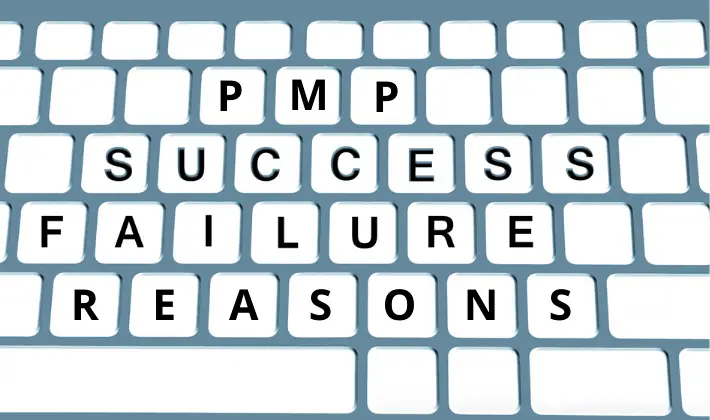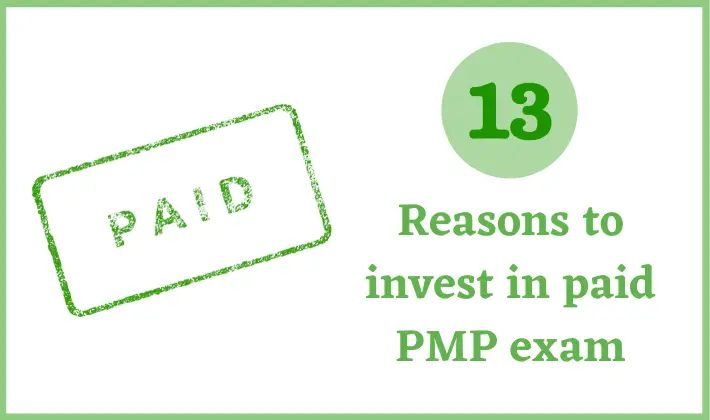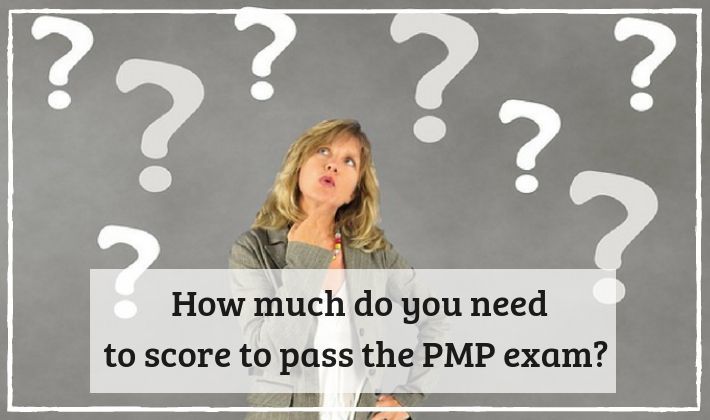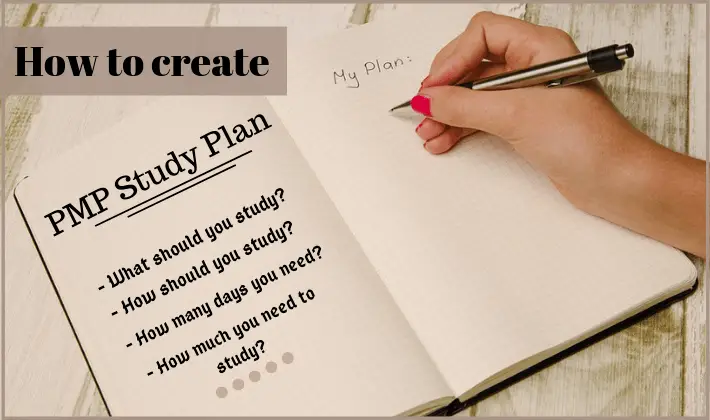You might have heard stories that many candidates fail the PMP exam in their first try.
This is not surprising considering that failure rate of PMP certification test is close to 50%.
What is surprising is that people fail in their second and third attempt also. In fact, I have heard about people who flunked in their 4th try.
I passed my exam back in 2005 in my first attempt. I studied for about a month. In those days, there was a dearth of study aids and we had to live with whatever we could get. Nowadays, there is plethora of study material so there is no reason why you cannot pass the PMP exam in your initial attempt.
It is true that PMP is a tough exam but it is not an impossible exam. You can easily pass the exam by following a proper strategy and studying hard for the exam.
I have written this post to discuss the top reasons for failing the credential exam and what can you do avoid the mistakes that others have made.
Why Candidates Fail PMP Exam & How can you Avoid it?
Most candidates fail the exam because of poor strategy. Here is a small video that will help you to prepare a PMP exam study strategy.
Many PMP aspirants fail because they make basic mistakes while studying for the exam. There is a beautiful concept in project management called “lessons learned”. You can learn from others’ mistakes and avoid them. This way you will be able to crack the exam in your first attempt.
Below is a list of common errors and mistakes that aspirants make while preparing for the exam.
1. Don’t Study PMBOK Guide
PMBOK Guide is an essential resource to study for the PMP exam.
Some people don’t read the Guide or just study it superficially. You should read the PMBOK Guide at least once to increase the chances of your success.
Under no circumstance, you should skip the Guide. It is an important resource to understand PMI’s terminology, concepts, and language. It will help you to successfully crack the exam.
There are many good reference books for the PMP exam prep. You can determine which PMP reference book is the best for you and study from it but no other book or study material can replace the PMBOK Guide. If you decide to study from a reference book, then you should study both the Guide and the reference book.
Note: There is a general misconception that the PMP exam is based on the PMBOK Guide. It is not but the Guide is an important resource for passing the exam.
2. Don’t Attend a Formal 35 Hours Training Program
You must attend a formal PMP training. It can greatly enhance your chances of passing.
Some people avoid the training because of the high cost. They think that they already have the requisite hours through college credits or through a previous training.
While some others attend a cheap training program just for the sake of getting 35 contact hours.
By doing these things, you can certainly save some money. But the cost of not attending a good training program is very high.
I would recommend you to attend a formal PMP boot camp the exam prep. A boot camp program has many benefits over other type of courses. But, if you feel that the fee for a good boot camp is high, then you should attend an online self-learning program.
3. Don’t Prepare a Formal Study Plan
A plan is must for making a project successful. Attempting PMP exam is a project and you should have a proper study plan for the PMP exam to pass it with flying colors.
I have noticed that many people study without a plan. They give myriad of excuses like busy work life, overtime, multiple projects, and stringent deadlines.
You should realize that everyone is busy. Some are more busy than the others but this should not become an excuse for following a disciplined study approach. It is imperative that you prepare a proper time table and study regularly.
If you fail to plan then you are planning to fail.
To successfully pass, you should start by preparing a formal study schedule and choose your study sources carefully. You should not have gaps in-between your studies unless there is a strong genuine reason. Every time there is a gap, you would need to put in extra effort to re-ignite your motivation and bring your studies back on track.
4. Over-rely on Free Internet Resources
You should study only from reliable study material. It doesn’t matter if it is free or paid.
You can certainly save some money by studying from free resources but an unreliable source can prove to be fatal.
Many resources on the Internet contain old and out-dated information. Many others have questionable information.
Do not just google something and start studying from I am not against free web-resources. This blog is also free but all free resources are not equal.
You should study only from trustworthy sources. You can follow 2-3 independent blogs and do some free questions from reputed training companies.
5. Don’t Practice Enough Mock Tests
There is an old adage “Practice makes a man perfect”. Solving mock questions will help you to validate your learning.
You should solve many questions from reliable sources before you take the exam. As per my experience, you should practice at least 2000 questions before appearing for the PMP exam.
You should do a combination of free and paid tests before appearing the exam.
6. Stress too much on Learning ITTO
You should thoroughly understand the concepts written in the PMBOK Guide that includes understanding Inputs, Tools & Techniques, and Outputs (ITTO) but you should not consider that PMP exam is about mugging up ITTO.
Most of the exam questions are situational questions. You need to understanf the right terminology including ITTO terms to solve these questions but a pure memorization of definitions, processes and ITTO will surely lead to failure.
Many people are fearful of ITTO. But, you don’t have to worry. I have written series of ITTO articles and developed comprehensive learning strategies to help you. You can start by downloading free ITTO process chart.
7. Skip or Skim Through Exam Questions
You should not skip and part of the exam question. The exam questions hide important words/phrases in between redundant information.
So, you should answer the question only after reading through the question statement and all the options carefully.
You can read my article on how to answer the PMP questions to find out answering tips.
8. Avoid doing Full length Tests
You should do a few full length practice tests using a simulated software. This will validate your learning. It will also help you to gauge your speed and accuracy levels.
PMP exam is a long exam. You will need more than fours hours to sit through the exam. Practicing full-length tests will improve your concentration level amd sitting capacity.
I would recommend that you to look at my article on review and comparison of top PMP exam simulators before investing in a paid test.
9. Understand Mathematical Concepts & Practice Formula Based Questions
You should have a complete understanding of the mathematical concepts and you must practice formula based questions. You might get a few numerical questions in the exam.
You can download free PMP formulas cheat sheet to understand the formulas described in the PMBOK Guide.
10. Over-rely on Personal Experience
You should not use your own personal project management experience while answering the PMP questions even if you have managed many projects successfully.
Many people become over-confident after successfully completing 1-2 projects but managing projects is quite different from attempting the exam.
The PMP exam is a project management exam but it used the terminology and best practices from the PMBOK Guide, which is written in a certain way. You need to follow what is written in the Guide.
You can use your project management experience to study and understand the Guide’s concepts but you should not use the it while answering the questions. You should not deviate from the concepts written in the Guide while taking the exam.
You can read my post on Why Project Management Experience is Bad for PMP Exam Result? for more details.
11. Don’t Use English Language Study Material
Exam questions for all PMI credential tests are formulated in English.
This can become disadvantage for you if English is not your native language but this should not become your excuse for failing the PMP Exam. You should spend more time for the exam prep to overcome this handicap.
The PMP exam started from the USA and the exam prep companies also started from there. Today, most good exam prep material is in English so you must study from English language study material.
PMI does provide language aids for the PMP exam (at no additional cost) to non-English speaking aspirants. You can request for your preferred language aid at the time of applying to the PMP exam. These language aids translate English questions to your preferred language.
Although language aids are available and you don’t have to pay anything extra, I would suggest that you should not use these aids. During the exam you are pressed for time and you do not want to waste precious moments for translating an English question to your native language. Some people fail because they have re-read the exam questions in order to understand them properly.
You may request language aid before the exam but try to avoid using them. It is better to be prepared upfront for the English exam.
12. Attempt the Exam Before Being Ready
This is a tricky one. No one knows if she/he is ready for an exam. Any exam.
However, you are in luck.
You should read my article best way to determine PMP Exam passing score to check your readiness for the exam. If you are not ready, then it is better to postpone your exam date (even if it means losing some money).
You should score at least 80% in full-length practice tests before taking a shot at the real exam.
PMP Exam Coaching Services
If you need help for the exam preparation and studies, you can join my personal one-on-one coaching through telephone or email.
Telephonic Coaching: This service can be used by both first time PMP test takers and those who have unfortunately failed the exam. You can read more about it here – PMP coaching.
Email Coaching: This service is specially designed for those people who unfortunately failed the exam. It is an unlimited one-on-one coaching wherein I provide guidance through emails. You can read more about it here – PMP email coaching.
The email service comes with 100% lifetime guarantee. I will respond to all your queries and will provide unlimited email support to you till you pass the exam.
Final Thoughts
You might feel that the title of the post is a bit negative but I have not written this post to discourage you. Rather, I have written this post so that you can avoid failing in the PMP Exam.
You should not despair even if you have did not clear the PMP exam in your previous attempt. It is not the end of the world. You just need to put in some more study hours to get through in your next attempt.
As per my experience, if you study well and follow the right process, no one can stop you from passing the PMP Exam.
The key to success PMP Exam is 50% perspiration and 50% preparation.
You will have to perspire and you will have to prepare. No one else can do that for you.
The PMP Exam is considered to be a difficult exam and it is. There is no easy way out. So, you need to study hard. But, at the same time, you must perspire & prepare in the right direction.
Over To You
Did this article help you in your exam prep? Would you change your prep process after reading this article? Which point do you think was most relevant? Please leave a comment.
Good luck to all the PMP aspirants.






![7 Different Type Of Questions In PMP Exam [2024]](https://www.pmbypm.com/wp-content/uploads/2021/04/pmp-qus.png)


I am impressed this blog for sharing this very important information. I hope some people will read this article.
Thanks
Thank you very much for sharing this very important information. This is totally helpful for those are planning to take PMP examination.
Thank you sir.
Really interesting what you posted here.More informative and very useful content.keep sharing
going to write PMP exam next week.
As my application will expire on 01-Jun-16.
Syed, All the best.
thanks Sir, this article is helpful!
Sir what is your opinion about the new changes to the exam…any advice will be highly appreciated.
There is a slight change in in the PMP pattern – the percentages for different domains have changed and Project Manager’s role is as per the new Role Delineation Study (RDS).
You should look at following articles to understand the complete details.
1. What are PMP Exam Changes for January 2016? (https://www.pmbypm.com/what-are-pmp-exam-changes-for-january-2016/)
2. Frequently Asked Question on Change in PMP Exam (https://www.pmbypm.com/change-in-pmp-exam-2/)
The pattern change happened in January 2016. But it should not bother an aspirant now. You just need to study the new study material and ignore the old material.
However, even if you have old study material then also you should not worry. The changes are small. You can study the old material along with the new RDS. Other option is to attend a formal training again – 6 Reasons To Do A PMP Training Again (https://www.pmbypm.com/pmp-training-again/)
All the best
I failed twice. I stumbled on your post. Well written. I followed your points. I passed third time. Many thanks.
Hi Latrice, Thanks for the appreciation. Good luck.
Sir ! In my last attempt, i lost it due to situation based (or scenario based) questions where more than one option seems to be correct. These questions are pretty subjective in nature. How to prepare for them ?
Thanks.
Hi Gaurav,
That is sad. But you will have better luck next time.
Scenario based Q form the bulk of the exam. Did you read – how to answer the PMP questions? related to point VII-X above?
Secondly, did you read – 7 strategies to answer ITTO questions related to point VI above? Scenario based Q cannot be answered without understanding the relationships between processes.
Lastly, you should practice lot of Q. Don’t go for the exam unless you are ready for it. You should read Best way to determine PMP Exam passing score related to point XV above.
Good luck.
Amazing content. Now this is what I call a full-on review. Thank you so much.
– From Tokyo
I have followed 80% of what you have outlined.
And still failed the exam 3 times by a margin.
I have over 10 years experience in Project Management and still wonder what went wrong with my exam. I actually thought the questions were straight forward.
I’m not sure now. I’m really skeptical about all this.
My motivation for the PMP license is diminishing rapidly.
Hi Marie, That’s sad. PMI want answers aligned to the PMBOK Guide. PMI does not want what you might have done in your projects. So you have to be very careful.
You have change your prep strategy and study material if something is not working.
Which 20% you did not follow? Were you able to identify RC of the failure? What did you do to improve the shortcomings in subsequent attempts?
BR
Praveen.
Sir,
It’s a detailed blog with loads of info for anyone to grab & prepare. May I know if you have documented anything around the recent changes to PMP examination pattern? If yes do we need to change in the above strategies?
Nidhi
Hi Nidhi, If you are looking for PMBOK Guide 6th ed changes, you can look at https://in.pinterest.com/pmbypm/pm-by-pm/ and https://www.pmbypm.com/new-pmp-exam-pmbok-guide-6th-edition-2017/
The PMBOK Guide, which is he main reference book for the the exam, has changed but the exam structure remains the same. The strategy for exam prep remain same and this is a current article. Hope t helps.
BR, Praveen.
I think my confidence is boosted manifolds after reading this. I feel. I feel you can add PMP dumps to the list.
Thanks for your valuable sharing,I hope this would be the best practices to pass PMP exam in first attempt.
Now, I am feeling positive.
Best regards,
Praveen Lokesh
Good luck. Do share your experience when you pass the exam. BR, Praveen.
Well written article. I passed my PMP exam with above target in all domains a few weeks ago. I did not attend a boot camp, did not read the PMBOK, nor did I take any simulated exams. I also had no project management experience to the level taught for the PMP. I used Linked In Learning and watched some YouTube videos. I would add to focus on learning the overall process itself. Just knowing in what general order everything goes in will help answer many questions.
Thanks for your comment and sharing your experience.